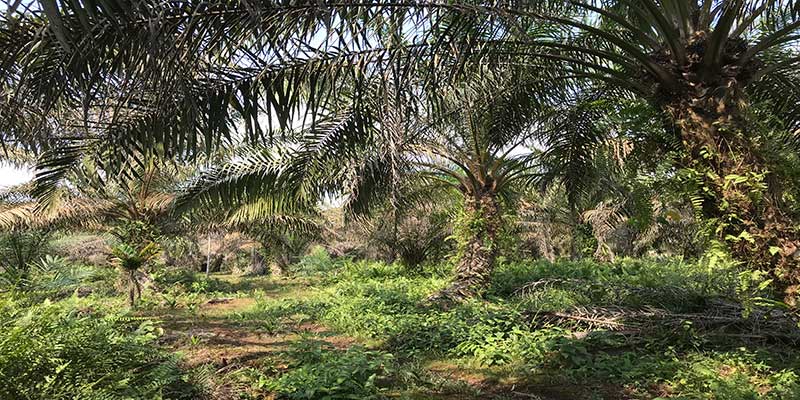Improving sustainable oil palm
-
Case study
- Environmental Sustainability and Resilience
Posted on 20 May 2022
Researchers are working to improve the sustainability policies for protecting rainforest in oil palm landscapes. This research is helping to conserve biodiversity and reduce carbon emissions across large parts of the tropics.

This project demonstrates how world-class research improves sustainability.
The issue
Globally, about 30% of vegetable oil is sourced from palm oil, but expansion of oil palm plantations has caused widespread deforestation, resulting in substantial losses of biodiversity and releasing huge quantities of CO2. Concerns about these detrimental environmental impacts led to the Roundtable on Sustainable Palm Oil (RSPO) being set up as the main voluntary sustainability certification body for palm oil. The UK has committed to sourcing sustainable palm oil and removing deforestation from supply chains.
RSPO certification requires the conservation of areas of forest with High Conservation Values (e.g. containing rare, threatened or endangered species), prohibits new plantings on primary forest and peatland, and recently implemented a zero-deforestation policy via the High Carbon Stocks Approach (which identifies areas of forest to protect).
The challenge for our researchers was to evaluate the environmental consequences of RSPO certification, and test its benefits for boosting biodiversity and conserving carbon stocks.
The research
Our research examined biodiversity loss following conversion of rainforest to oil palm, and the ecological benefits of retaining patches of natural rainforest within oil palm plantations.
Through our ‘Socially and Environmentally Sustainable Oil Palm Research’ (SEnSOR) programme, we collected new field data, collated existing information, and carried out computer modelling to test the environmental benefits of RSPO sustainability policies.
We showed that the conversion of forest to oil palm causes the loss of at least half of rainforest species, altering animal communities and their ecosystem functioning. The forest patches that remain in plantations have lower species richness but contribute to maintaining biodiversity in the wider landscape.
Larger forest patches (>200ha core area) can support ~60-70% of forest biodiversity and boost plantation carbon stocks by ~20%, as well as raising the biodiversity of neighbouring agricultural areas. These forest patches can also improve connectivity and aid movement of species across inhospitable landscapes.
The outcome
We have made significant impacts in improving the environmental sustainability criteria for palm oil.
Our research has contributed to zero-deforestation policies adopted by members of the RSPO, who are spread over ~50 countries across the globe, securing the protection of ~790,000ha of rainforest to-date. Forest patches which are conserved in RSPO certified plantations protect many International Union for Conservation of Nature ‘Red List’ threatened species.
Our research has fed into the RSPO’s High Conservation Values policy, providing recommendations on the minimum effective size of forest patches as well as evidence for their effectiveness for improving landscape connectivity.
We provided policy-relevant research for implementing High Carbon Stocks Approaches (HCSA), supporting RSPO members to commit to their zero-deforestation commitments. The HCSA process has been adopted by some of the largest oil palm growers who now have the tools to deliver on their no-deforestation commitments.

Jane Hill
Professor Hill’s research examines how biodiversity is changing as a consequence of habitat destruction and climate warming.
